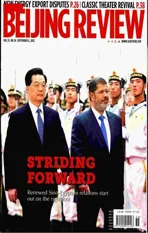A Sustained Relationship
2012-12-21
A Sustained Relationship
When Chinese President Hu Jintao told his Egyptian counterpart Mohamed Morsi during their recent meeting in Beijing that Sino-Egyptian relations have “stood the test of time,” he meant exactly what he said. Morsi’s visit itself was a testament to the enduring nature of these relations.
The visit drew intense scrutiny partly because it came only two months after Morsi assumed presidency following Egypt’s strenuous political transition. Since unrest broke out early last year, dramatic changes have taken place in the Middle East nation, culminating in the election of a new president in June. But the tumultuous developments have not disrupted relations between China and Egypt. Over the past year, the two countries have not only been able to coordinate stances on the ongoing turmoil in the region but also seen a notable expansion of their business ties. Bilateral trade totaled $8.8 billion in 2011, up nearly 30 percent over the previous year. China’s annual direct investment in Egypt also soared 60.4 percent year on year to reach $82.8 million last year.
One of the factors that helped keep the Sino-Egyptian relationship on the right track is the Chinese Government’s unbiased stance toward the upheaval in the Middle East. While calling for an end to violence, China believes conflicting parties could find a solution through negotiations without foreign intervention. Unlike Western countries, it seeks to engage all parties in an inclusive dialogue instead of siding with some against others. Morsi’s choice of China as the destination of his first state visit outside the Middle East and Africa could have sent the signal, among others, that Egypt’s new government identifies with China’s non-interference approach.
During his visit in late August, Morsi held talks with Chinese leaders including President Hu, Premier Wen Jiabao and Vice President Xi Jinping, all vowing to take bilateral relations to higher levels. China and Egypt also signed eight agreements while Morsi was in Beijing, covering areas such as agriculture, the environment, telecommunications and tourism.
Indeed, the continuity of Sino-Egyptian relations is rooted in the fact that both countries view each other as important partners. China cherishes a special bond with Egypt, the first country in the Middle East and Africa to establish diplomatic relations with the People’s Republic. It values Egypt’s role in helping China reach out to the entire region. Egypt, for its part, is anxious to get support from China in a bid to invigorate its lackluster economy in the wake of social turbulence. It also tends to make relations with China a diplomatic priority as the new government rebalances the country’s formerly Western-oriented foreign policy.
More importantly, China and Egypt share a host of essential values. Proud of their time-honored civilizations, both nations are imbued with a keen sense of cultural diversity. With this in mind, they advocate respect for other countries’ development models, non-interference in other countries’ domestic affairs and the importance of transcending ideological differences—principles that constitute the cornerstone of Sino-Egyptian relations. Given these shared commitments, coupled with practical needs, these relations look poised to remain on an upward spiral whatever changes may come.
